Week 4
Hi all, for this weeks blog I am submitting the research proposal assignment I worked on this week.
1. Introduction:
Importance of Research:
The realm of sports analytics is consistently in pursuit of innovative approaches to deepen our comprehension of the elements influencing match outcomes. In this context, the significance of investigating the correlation between team travel factors and performance in USL soccer matches becomes apparent.
Recognizing the impact of travel, encompassing distance and time zone differences, on team performance is imperative for crafting more precise predictive models. This research contributes to the refinement of strategies for soccer teams in the USL, offering invaluable insights for both teams and analysts. Predictive models emanating from this research can find applications in sports betting, facilitating more informed predictions for betting markets. The discoveries can shape league policies, fostering fairness and competitiveness throughout the entire USL. Furthermore, this study serves as a reference for academics exploring the repercussions of travel on performance in diverse contexts.
Conducting research in this domain is essential for uncovering intricate relationships between travel factors and team performance. By discerning correlations, we can construct models that not only elucidate past outcomes but also prognosticate future match results, ultimately amplifying the competitive edge of soccer teams.
2. Research Methodology:
Data Collection:
To conduct this research, we will collect data on team travel distance and time zone differences for each match in the USL. Additionally, xG (Expected Goals) data will be obtained from American Soccer Analysis (AmericanSoccerAnalysis.com), a reputable source for advanced soccer statistics.
Statistical Analysis:
Statistical methods, including correlation analysis, will be employed to explore relationships between travel factors and team performance. The goal is to identify patterns and quantify the extent to which travel influences soccer match outcomes.
3. Variable Table:
|
Variable Name |
Type |
Units |
Description |
|
Team Travel Distance |
Independent Variable |
Km |
Distance covered by the team during travel |
|
Time Zone Difference |
Independent Variable |
Hours |
Difference in time zones between home and away locations |
|
xG (Expected Goals) |
Dependent Variable |
Unitless (Statistical) |
Statistical measure of a team's expected goal performance |
|
Team Performance |
Dependent Variable |
Unitless (e.g., points) |
Overall performance of the team in USL matches |
4. Overview of Expected Results:
Research Question:
What is the correlation between team travel factors (distance and time zone difference) and team performance in USL matches?
Hypothesis:
There is a significant correlation between the distance and time zone difference a team travels and their performance, as measured by the xG stat.
Anticipated Results:
We anticipate discovering a meaningful correlation that sheds light on the influence of team travel on soccer performance. This correlation will serve as a foundation for building predictive models that contribute to a more nuanced understanding of match outcomes in the USL.
Conclusion:
In conclusion, this research aims to bridge the gap between travel factors and soccer performance in the USL, offering practical insights for teams, coaches, analysts, and the broader sports community. The potential applications extend beyond soccer, impacting various industries and contributing to the evolving landscape of sports analytics.



Comments
Post a Comment